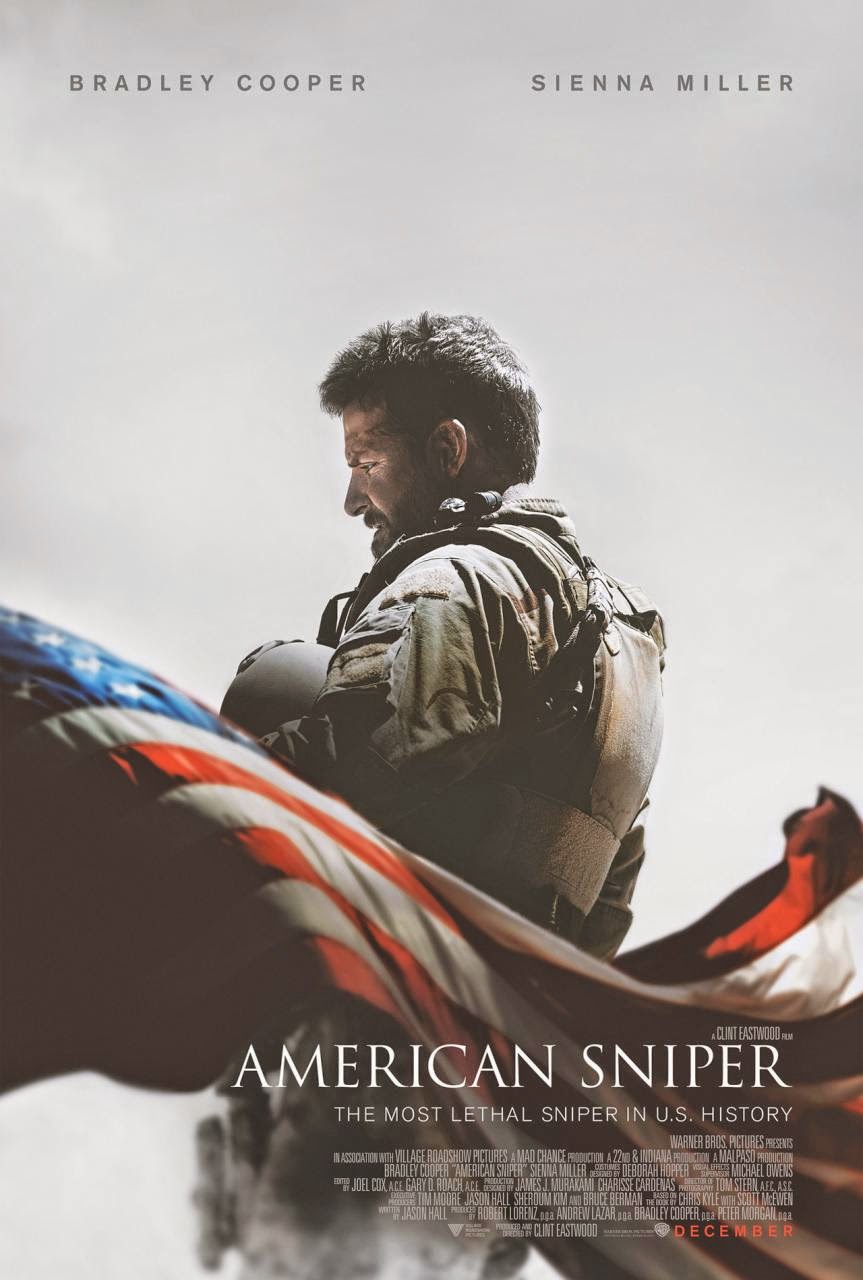the two funerals of AMERICAN SNIPER
Sometimes when artists want to dodge controversy, they say that art is a mirror.
"I didn't create this reality," they claim, "I'm just showing you how it is. What you see in that mirror is only what you bring to the experience."
This comment is both astute, and bunkum.
Bunkum, because art is about selection, and no good art is ever made without a high degree of intention behind each choice-of-inclusion. The "art as mirror" thing fails, I think, when it's held up as an excuse for the deferment of artistic responsibility.
On the other hand...
Art uses the world-as-it-is as raw material, and good art presents questions for the viewer/reader/hearer's consideration without a heavy-handed insistence on what conclusions should be drawn... which I guess is sort of the function of a mirror.
So.
 AMERICAN SNIPER, as I wrote a couple days ago, is a good movie. It tells a real, human story, and invites us to think about what that story means. It picks and chooses what aspects of that story to tell us in order to guide our perception and our conclusions, yes, but I don't think it does this in a coercive way. As a result, we end up seeing (or not seeing) a very different film, depending on where we're coming from.
AMERICAN SNIPER, as I wrote a couple days ago, is a good movie. It tells a real, human story, and invites us to think about what that story means. It picks and chooses what aspects of that story to tell us in order to guide our perception and our conclusions, yes, but I don't think it does this in a coercive way. As a result, we end up seeing (or not seeing) a very different film, depending on where we're coming from.
So here's something I noticed about AMERICAN SNIPER, as a quasi-pinko-commie-anti-nationalism-non-partisan-hippie-dippy-peacenik: There are two funerals depicted in this film, and they are very, very different from each other.
[SPOILER ALERT]
The first funeral is for a guy in Chris Kyle's unit. A fellow sniper—living through the same hellstorm conditions and doing the same job—is hit by enemy fire and dies right there in the desert. They bring his body home and hold a funeral for him. A small gathering of friends and family is there, someone plays "taps," and a few guys hand-pound their pins into the lid of the coffin. There's the traditional twenty-one-gun salute. The handing of the fresh-folded flag to the widow.
All the things we do to remember/honor/whatever the people who die in our country's wars.
The second funeral is for Chris Kyle, and is shown using actual footage. The footage starts early, with a massive motorcade and scores of flag-waving fans patriots lining the streets and overpasses. Then there's a much, much larger gathering at a cemetery, where the entire surface of the coffin gets covered with hand-pounded pins. Then a memorial in an NFL stadium, with a huge-screen display and somebody else playing "taps."
Director Clint Eastwood presents these contrasting funerals to us without comment.
This is a mirror.
Most people will likely never notice they've been shown a mirror. I'd wager that folks from the boo-rah-America side of the fence would view the second funeral as a beautiful and moving tribute to a man who served his country well and died afterwards, whilst trying to make it a better place.
Me, I see the contrast.
I see the contrast, and I see it as reflective of the war-obsession of America.
I see it as a reflection of the heroization of the military, and specifically of someone in the military who meets our burning messiah-desire... our yearning for someone with "uber-human" abilities to adore.
I see it as a reflection of the very human desire to make symbols of people—to affix to their lives (and, often, deaths) a greater significance than they might otherwise have.
I see it as a reflection of our desire/need to have all the death and chaos and violence of this world mean something. Especially the violence and chaos in which we play a part (at least complicitly).
I see it as a reflection of the cult of celebrity in this nation, where a guy like Chris Kyle's gonna be memorialized so vigorously not because his sacrifice was any greater than his fellow soldiers', but because he was famous. Because he (sort of*) wrote a bestselling book. Because he had a vigorous, public feud with another celebrity.
Yes, Kyle's death was tragic, and that tragedy does play a part in the outpouring of emotion his death prompted. And no, I don't think we should blame the filmmakers for the supposed "controversy" that we bring to the film with our own, highly-tinted lenses.
But the wild contrast in the two funerals of AMERICAN SNIPER means something, and I think it's worth asking what that something is. Otherwise we'll have turned another mirror to the wall—walking out of the theater without having taken the chance at a healthy (and much-needed) dose of self examination.
- - -
*Celebrities don't usually write their own autobiographies, because they're usually famous for something other than writing—which takes a lot of effort to learn to do well. I tend to think this means they shouldn't get to call them autobiographies... but, whatever.
- - -
Thanks for reading this post. If it meant something to you, please share it on your social internets.





Comments
Post a Comment